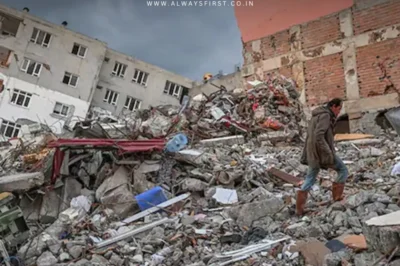Key Highlights:
- Google’s Android Earthquake Alerts (AEA) system failed to send critical warnings to millions in Turkey before the deadly 2023 quake.
- Only 469 people received the highest-level “Take Action” alert, despite nearly 10 million living near the epicenter.
- Experts criticize delays in transparency, raising concerns about over-reliance on tech for disaster warnings.
Google’s Earthquake Alert System Failed Turkey When It Needed It Most
In February 2023, two massive earthquakes struck Turkey, killing over 55,000 people and injuring more than 100,000. Amid the devastation, a critical failure emerged: Google’s earthquake warning system did not alert millions at risk, leaving most unprepared for the disaster.
The Android Earthquake Alerts (AEA) system, designed to detect tremors and send life-saving warnings, only issued its highest-level “Take Action” alert to 469 people—despite nearly 10 million living within 98 miles of the epicenter. Instead, around half a million users received a less urgent “Be Aware” notification, which doesn’t override silent settings and likely went unnoticed as the first quake hit at 4:17 AM.
Why Did the System Fail?
Initially, Google claimed the system “performed well.” But internal findings revealed a shocking underestimation—the system registered the 7.8 magnitude quake as just 4.5 to 4.9, drastically reducing the number of alerts.
A second major tremor later that day saw slight improvements—8,158 “Take Action” alerts and nearly 4 million “Be Aware” warnings—but still fell short given the quake’s severity.
A Flaw in the Algorithm?
Google’s system relies on smartphone accelerometers to detect seismic activity, aiming to give users crucial seconds to react. However, a revised simulation showed that 10 million should have received urgent alerts, suggesting a major software flaw.
In a Science journal study, Google admitted “limitations to the detection algorithms.” The company has since updated its system and expanded coverage to 98 countries, but the delay in addressing these flaws has drawn criticism.
Experts Demand Transparency & Better Public Systems
Elizabeth Reddy, a seismology expert at the Colorado School of Mines, expressed frustration: “People died—we didn’t see the warning performance we expected.” Others, like Harold Tobin of the Pacific Northwest Seismic Network, worry that governments might rely too heavily on Google’s system, neglecting robust public warning infrastructure.
Google insists its alerts are meant to supplement—not replace—national systems. Yet, the Turkey disaster raises urgent questions: Can tech giants be trusted with disaster warnings? And will improvements come fast enough to save lives next time?








































Leave a Reply